Unit 1 Where did you go on vacation? Section A Grammar Focus-3c(第2课时)课件(33张PPT)
文档属性
| 名称 | Unit 1 Where did you go on vacation? Section A Grammar Focus-3c(第2课时)课件(33张PPT) |
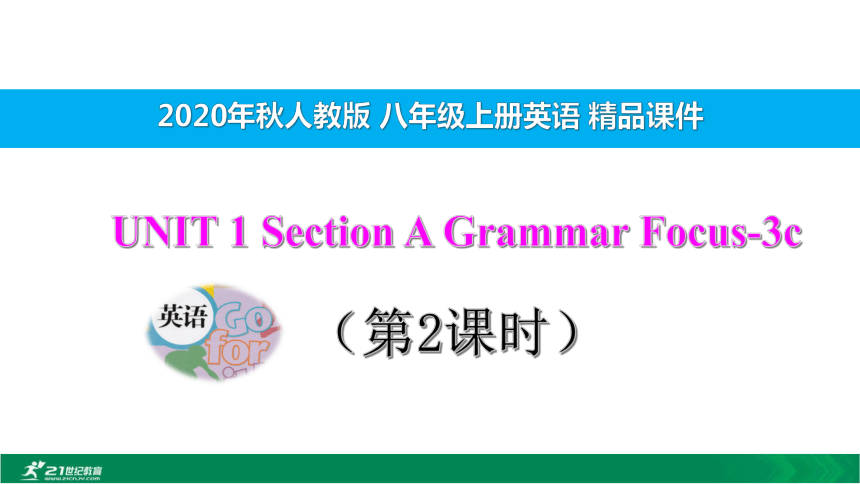
|
|
| 格式 | pptx | ||
| 文件大小 | 1.1MB | ||
| 资源类型 | 试卷 | ||
| 版本资源 | 人教新目标(Go for it)版 | ||
| 科目 | 英语 | ||
| 更新时间 | 2020-07-24 00:00:00 | ||
图片预览

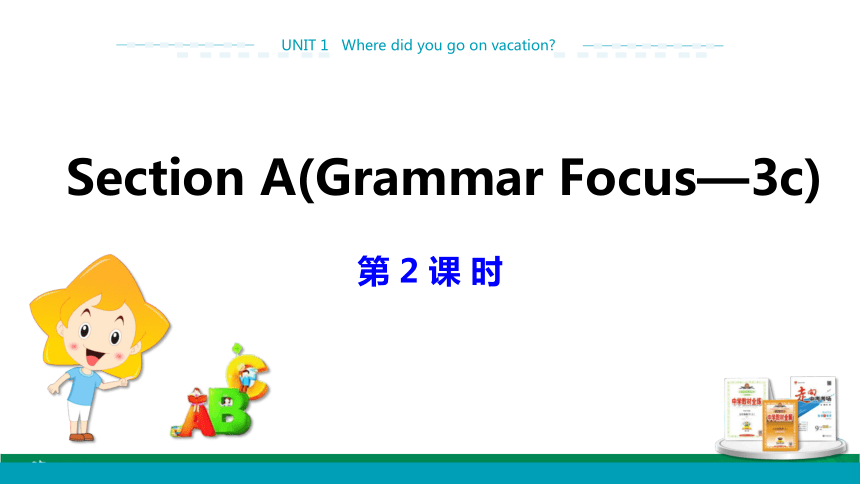
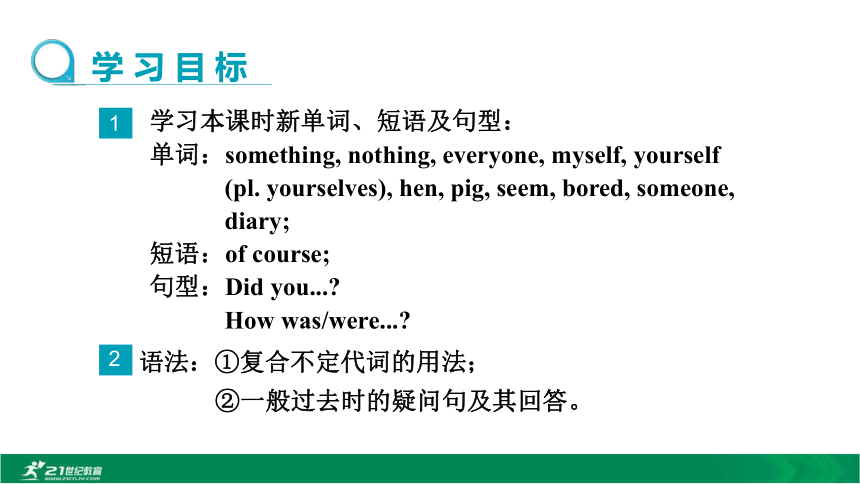
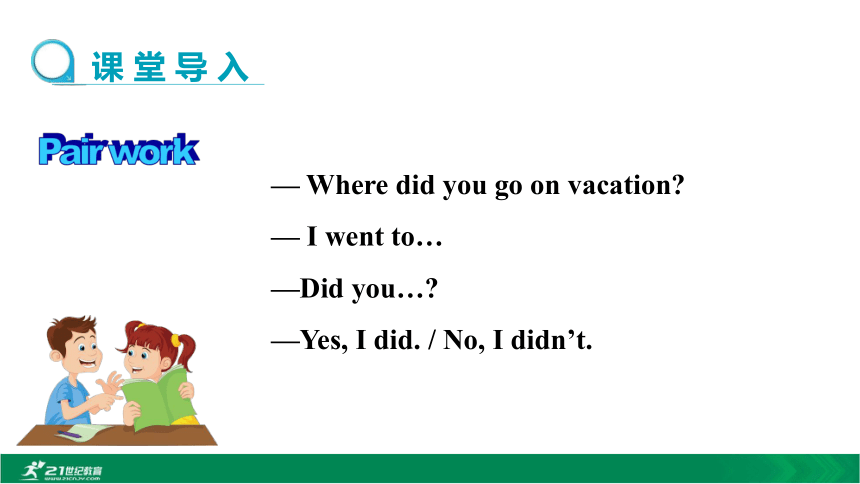
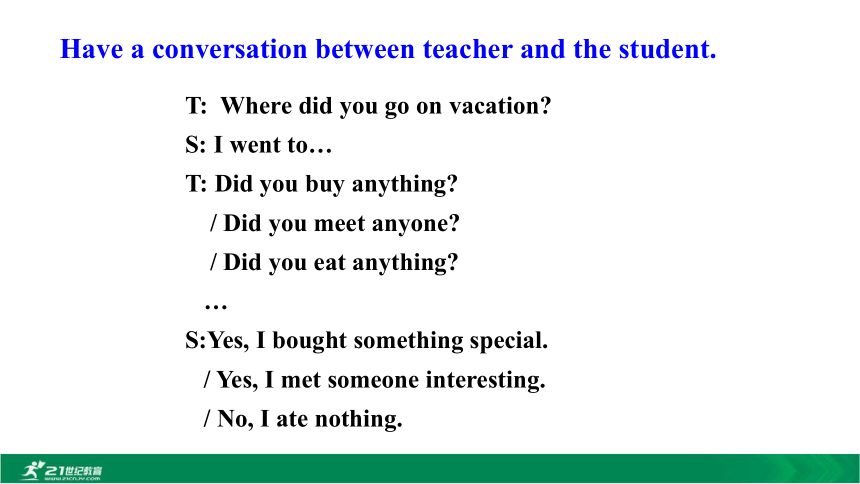
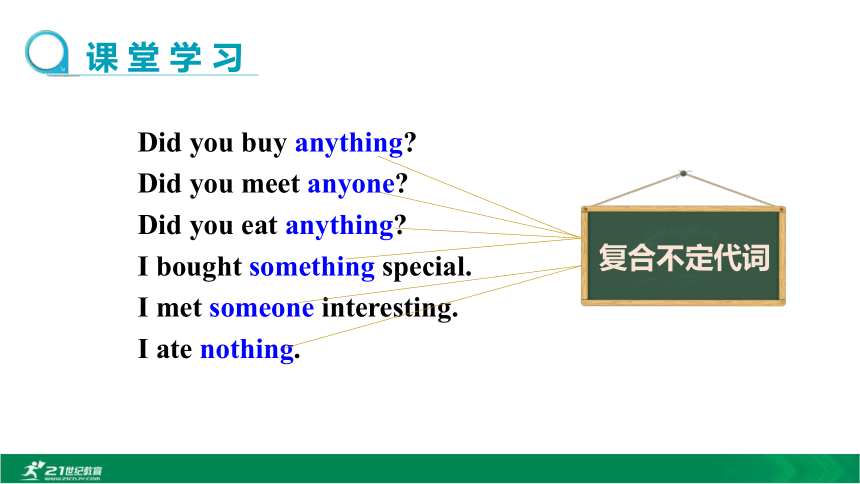
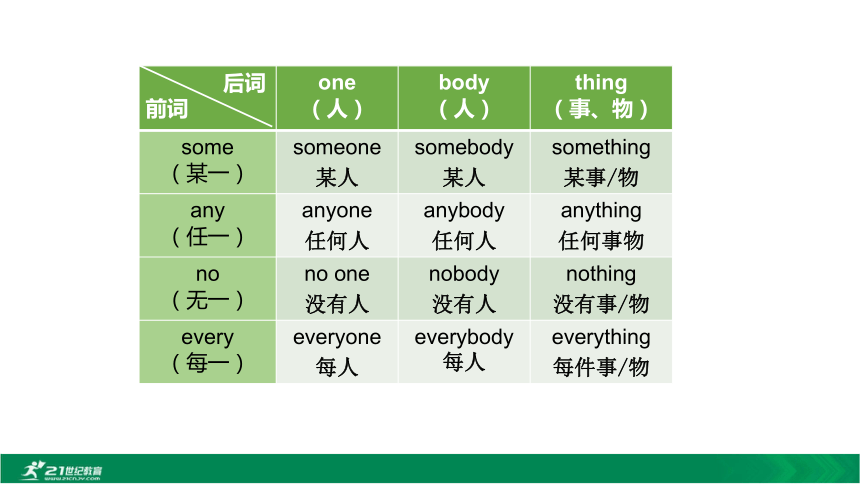
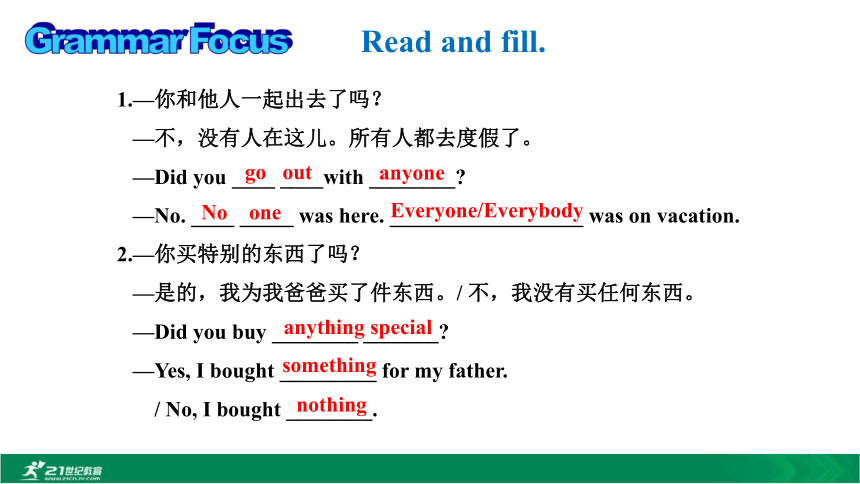
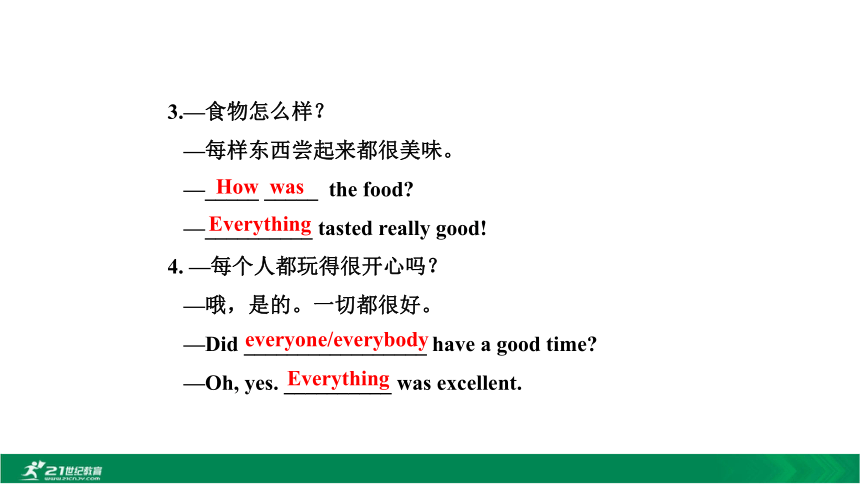

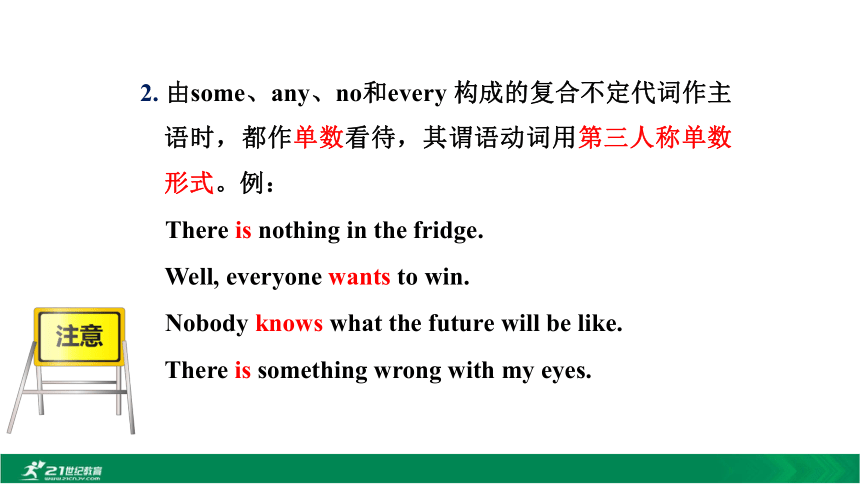
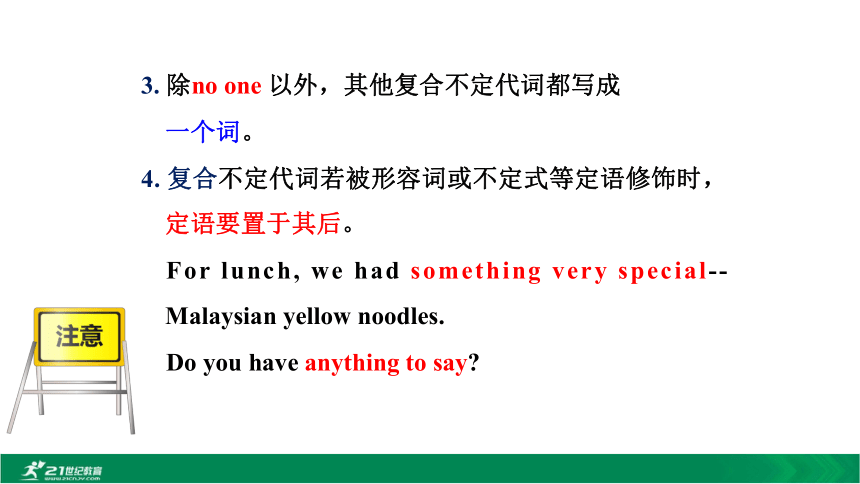
文档简介
2020年秋人教版 八年级上册英语 精品课件
UNIT 1 Section A Grammar Focus-3c
(第2课时)
Section A(Grammar Focus—3c)
UNIT 1 Where did you go on vacation?
第 2 课 时
学 习 目 标
学习本课时新单词、短语及句型:
单词:something, nothing, everyone, myself, yourself
(pl. yourselves), hen, pig, seem, bored, someone,
diary;
短语:of course;
句型:Did you...?
How was/were...?
1
语法:①复合不定代词的用法;
②一般过去时的疑问句及其回答。
2
课 堂 导 入
— Where did you go on vacation?
— I went to…
—Did you…?
—Yes, I did. / No, I didn’t.
Pair work
Have a conversation between teacher and the student.
T: Where did you go on vacation?
S: I went to…
T: Did you buy anything?
/ Did you meet anyone?
/ Did you eat anything?
…
S:Yes, I bought something special.
/ Yes, I met someone interesting.
/ No, I ate nothing.
课 堂 学 习
Did you buy anything?
Did you meet anyone?
Did you eat anything?
I bought something special.
I met someone interesting.
I ate nothing.
复合不定代词
{93296810-A885-4BE3-A3E7-6D5BEEA58F35} 后词
前词
one
(人)
body
(人)
thing
(事、物)
some
(某一)
someone
某人
somebody
某人
something
某事/物
any
(任一)
anyone
任何人
anybody
任何人
anything
任何事物
no
(无一)
no one
没有人
nobody
没有人
nothing
没有事/物
every
(每一)
everyone
每人
everybody每人
everything
每件事/物
Read and fill.
1.—你和他人一起出去了吗?
—不,没有人在这儿。所有人都去度假了。
—Did you ____ ____with ________?
—No. ____ _____ was here. __________________ was on vacation.
2.—你买特别的东西了吗?
—是的,我为我爸爸买了件东西。/ 不,我没有买任何东西。
—Did you buy ________ _______?
—Yes, I bought _________ for my father.
/ No, I bought ________.
go out
anyone
No one
Everyone/Everybody
anything special
something
nothing
Grammar Focus
3.—食物怎么样?
—每样东西尝起来都很美味。
—_____ _____ the food?
—__________ tasted really good!
4. —每个人都玩得很开心吗?
—哦,是的。一切都很好。
—Did _________________ have a good time?
—Oh, yes. __________ was excellent.
How was
Everything
everyone/everybody
Everything
1.由some-构成的复合不定代词多用于肯定句,由any-构成的复合不定代词多用于否定句、疑问句或条件状语从句中。
There is someone outside the door.门外有人。
I don’t have anything to say today.
我今天没什么可说的。
Is there anyone in the room?房间里有人吗?
2. 由some、any、no和every 构成的复合不定代词作主语时,都作单数看待,其谓语动词用第三人称单数形式。例:
There is nothing in the fridge.
Well, everyone wants to win.
Nobody knows what the future will be like.
There is something wrong with my eyes.
3. 除no one 以外,其他复合不定代词都写成
一个词。
4. 复合不定代词若被形容词或不定式等定语修饰时,定语要置于其后。
For lunch, we had something very special--Malaysian yellow noodles.
Do you have anything to say?
3a
Fill in the blanks with the words in the box and practice the conversation.
Linda: Did you do ________ fun on
your vacation, Alice?
Alice: Yes, I did. I went to Sanya.
Linda: How did you like it?
Alice: Well, it was my first time there,
so _________ was really interesting.
anything
everything
anyone
something
anything
everything
nothing
Linda: Did you go with ________?
Alice: Yes, I did. I went with my sister.
Linda: Did you go shopping?
Alice: Of course! I bought _________ for
my parents, but _______ for myself.
Linda: Why didn’t you buy ________ for
yourself?
Alice: I didn’t really see ________ I liked.
anyone
something
nothing
anything
anything
anyone
something
anything
everything
nothing
3b
Fill in the blanks in the e-mail message with the words in the box.
anything everything nothing everyone no one
Dear Bill,
How was your vacation? Did you do ________ interesting? Did ________ in the family go with you? I went to a friend’s farm in the countryside with my family. ___________ was great. We fed some hens and saw some baby pigs. They were so cute! The only problem was that there was _______ much to do in the evening but read. Still _______ seemed to be bored. Bye for now!
Mark
anything
everyone
Everything
nothing
no one
Pair work
—Where did you go on vacation?
—I went…
—Did you have a good time?
—Yes,I did.
—Did you see/ eat/buy/visit/meet/…?
—Yes, I did./ No, I didn’t.
Did you…
Everyone
Someone(write the classmate’s name)
No one
eat anything at a
restaurant?
read anything
interesting?
visit anyone in
your family?
buy anything?
keep a diary?
Ask your group questions about their last vacation. Then tell the class your results.
3c
In our group,
everyone ate
something at a restaurant …
Grammar
构成
用法
主语+过去式
表示过去某个时间发生的动作
或存在的状态。
2. 表示过去经常或反复发生的动作。
(the day before) yesterday;
last night / week/…;in 1999 ;
just now; On Sunday morning;
two days ago…
一般过去时
时间状语
系动词be的过去时: am (is) →was are →were
陈述句:主语+was/were+其他.
He was at home yesterday.
否定句:主语+wasn’t/weren’t+其他.
He wasn’t at home yesterday.
一般疑问句:—Was/Were+主语+其他?
—Yes,主语+was/were. (或: No,主语+wasn’t/weren’t)
—Was he at home yesterday?
—Yes, he was./ No, he wasn’t.
句子构成:
陈述句:主语+动词过去式+其他.
I went to the library.
否定句:主语+助动词didn’t+动词原形+其他.
I didn’t go to the library.
一般疑问句:—Did +主语+动词原形+其他?
—Yes, I did./No, I didn’t.
—Did you go to the library?
—Yes, I did./No, I didn’t.
实义动词的一般过去时:
1.How did you like it?你觉得它怎么样?
How do you like...?意为“你觉得……怎么样?”, 用来
询问对方的观点或看法。相当于What do you think
of/about...?或How do you feel about...?
How do you like your new job?
=What do you think of/about your new job?
=How do you feel about your new job?
你觉得你的新工作怎么样?
Language points
2.The only problem was that there was nothing much to do in the evening but read.唯一的问题是晚上除了读书之外没什么事可做。
nothing much to do意为“没什么事可做”。
There is nothing much to do,so I go to bed early.
没什么事可做,因此我就早早睡觉了。
【拓展】nothing(...) but...意为“除……之外什么也没有;只有”,but后可接名词。当but前有实义动词do, does或did时but后若接动词不定式应省略to,否则要带to。
I had nothing but a cup of tea this morning.
我今天早上什么也没吃,只喝了杯茶。
I had nothing to do but watch TV.我无事可做,只有看电视。
3.Still no one seemed to be bored.不过没有人看起来无聊。
(1)seem连系动词,意为“好像;似乎;看来”。主要用法
如下:
①seem (to be)+形容词/名词 “看起来……”。
You seem very happy today.你今天看起来很高兴。
②seem to do sth.“似乎/好像做某事”。
I seem to have a cold.我似乎感冒了。
③It seems/seemed+从句 “看起来好像/似乎……”。
It seems that no one believes you.看起来好像没有人相信你。
④seem like...“好像/似乎……”。
It seems like a good idea.这好像是个好主意。
(2)bored形容词,意为“厌倦的;烦闷的”。be bored with “对……厌烦”。
John is bored with his job.约翰对他的工作烦透了。
辨析:bored与boring
①bored“厌倦的;烦闷的;感到无聊的” ,常作表语,主语通常为人。
②boring“无趣的;令人厌烦的” ,可作表语或定语,常修饰或说明事物。
I’m bored with the boring story.
我对这个无聊的故事感到厌烦。
Summary
1.复合不定代词及其用法
①复合不定代词的构成
②形容词修饰复合不定代词时要后置
③复合不定代词作主语谓语动词用第三人称单数
2.一般过去时的疑问句及其回答
课 堂 达 标
Ⅰ.单项选择
1.—What a nice model plane!
—Thanks. I made it with 3D printer by_____ .
A.me B. him C. itself D. myself
2.(湖北黄石中考)In the future,robots will do ________ jobs in
place of people in order not to get us ________.
A. bored;bored B. boring;boring
C. boring;bored D. bored;boring
D
C
3. It ______ that everyone ______ to laugh.
A. seems; loves B. seem; love
C. seems; love D. seem; loves
4. (贵州铜仁中考) —Why do you come here?
—Because I have _______ to tell you.
A. anything important B. important anything
C. something important D. important something
5. We will have a sports meeting in October, but_____ knows
the date for sure.
A. everybody B. nobody C. anybody D. somebody
A
C
B
Ⅱ.根据汉语意思完成英语句子,每空一词。
1.莉莉除了上网,没有什么事可做。
Lily has _______ _____ __ __ but go online.
2.—我可以借用一下你的自行车吗?—当然可以。
—May I borrow your bike? —_____ _____.
3.你暑假中写日记了吗?
Did you ____ ____ _____ on your vacation?
4.上周日我和妈妈去购物了。
Last Sunday I ____ ________ with my mother.
5.就写到这里吧!
_____ _____ _____!
nothing much to do
of course
keep a diary
went shopping
Bye for now
Ⅲ.句型转换,每空一词。
1.What do you think of the book?(改为同义句)
____ ____ ____ ____ the book?
2.It seems sunny tomorrow.(改为同义句)
It seems __ __ _____ tomorrow.
3.I did my homework at 8:30 yesterday evening.(就划线部分提问)
_____ _____ you____ at 8:30 yesterday evening.
4.Tom bought something for his father.(改为否定句)
Tom _____ ____ ________for his father.
5.I was at school yesterday.(改为一般疑问句)
_____ _____ at school yesterday?
How do you like
to be sunny
What did do
didn’t buy anything
Were you
Ⅳ.用所给词的适当形式填空。
1.Children, please help _________(you)to some fish!
2.The little boy did nothing but _______(wait).
3. We ____ (see)some hens and _____(feed)them on
the farm last week.
4. This was my ______(one) time to go to New York.
5. Everything _______(be) excellent on my last vacation.
yourselves
wait
saw
fed
first
was
1. Remember the new words and expressions
in Grammar Focus-3c.
2. Preview Section B 1a-1e.
Homework
谢谢
21世纪教育网(www.21cnjy.com) 中小学教育资源网站
有大把高质量资料?一线教师?一线教研员?
欢迎加入21世纪教育网教师合作团队!!月薪过万不是梦!!
详情请看:
https://www.21cnjy.com/help/help_extract.php
UNIT 1 Section A Grammar Focus-3c
(第2课时)
Section A(Grammar Focus—3c)
UNIT 1 Where did you go on vacation?
第 2 课 时
学 习 目 标
学习本课时新单词、短语及句型:
单词:something, nothing, everyone, myself, yourself
(pl. yourselves), hen, pig, seem, bored, someone,
diary;
短语:of course;
句型:Did you...?
How was/were...?
1
语法:①复合不定代词的用法;
②一般过去时的疑问句及其回答。
2
课 堂 导 入
— Where did you go on vacation?
— I went to…
—Did you…?
—Yes, I did. / No, I didn’t.
Pair work
Have a conversation between teacher and the student.
T: Where did you go on vacation?
S: I went to…
T: Did you buy anything?
/ Did you meet anyone?
/ Did you eat anything?
…
S:Yes, I bought something special.
/ Yes, I met someone interesting.
/ No, I ate nothing.
课 堂 学 习
Did you buy anything?
Did you meet anyone?
Did you eat anything?
I bought something special.
I met someone interesting.
I ate nothing.
复合不定代词
{93296810-A885-4BE3-A3E7-6D5BEEA58F35} 后词
前词
one
(人)
body
(人)
thing
(事、物)
some
(某一)
someone
某人
somebody
某人
something
某事/物
any
(任一)
anyone
任何人
anybody
任何人
anything
任何事物
no
(无一)
no one
没有人
nobody
没有人
nothing
没有事/物
every
(每一)
everyone
每人
everybody每人
everything
每件事/物
Read and fill.
1.—你和他人一起出去了吗?
—不,没有人在这儿。所有人都去度假了。
—Did you ____ ____with ________?
—No. ____ _____ was here. __________________ was on vacation.
2.—你买特别的东西了吗?
—是的,我为我爸爸买了件东西。/ 不,我没有买任何东西。
—Did you buy ________ _______?
—Yes, I bought _________ for my father.
/ No, I bought ________.
go out
anyone
No one
Everyone/Everybody
anything special
something
nothing
Grammar Focus
3.—食物怎么样?
—每样东西尝起来都很美味。
—_____ _____ the food?
—__________ tasted really good!
4. —每个人都玩得很开心吗?
—哦,是的。一切都很好。
—Did _________________ have a good time?
—Oh, yes. __________ was excellent.
How was
Everything
everyone/everybody
Everything
1.由some-构成的复合不定代词多用于肯定句,由any-构成的复合不定代词多用于否定句、疑问句或条件状语从句中。
There is someone outside the door.门外有人。
I don’t have anything to say today.
我今天没什么可说的。
Is there anyone in the room?房间里有人吗?
2. 由some、any、no和every 构成的复合不定代词作主语时,都作单数看待,其谓语动词用第三人称单数形式。例:
There is nothing in the fridge.
Well, everyone wants to win.
Nobody knows what the future will be like.
There is something wrong with my eyes.
3. 除no one 以外,其他复合不定代词都写成
一个词。
4. 复合不定代词若被形容词或不定式等定语修饰时,定语要置于其后。
For lunch, we had something very special--Malaysian yellow noodles.
Do you have anything to say?
3a
Fill in the blanks with the words in the box and practice the conversation.
Linda: Did you do ________ fun on
your vacation, Alice?
Alice: Yes, I did. I went to Sanya.
Linda: How did you like it?
Alice: Well, it was my first time there,
so _________ was really interesting.
anything
everything
anyone
something
anything
everything
nothing
Linda: Did you go with ________?
Alice: Yes, I did. I went with my sister.
Linda: Did you go shopping?
Alice: Of course! I bought _________ for
my parents, but _______ for myself.
Linda: Why didn’t you buy ________ for
yourself?
Alice: I didn’t really see ________ I liked.
anyone
something
nothing
anything
anything
anyone
something
anything
everything
nothing
3b
Fill in the blanks in the e-mail message with the words in the box.
anything everything nothing everyone no one
Dear Bill,
How was your vacation? Did you do ________ interesting? Did ________ in the family go with you? I went to a friend’s farm in the countryside with my family. ___________ was great. We fed some hens and saw some baby pigs. They were so cute! The only problem was that there was _______ much to do in the evening but read. Still _______ seemed to be bored. Bye for now!
Mark
anything
everyone
Everything
nothing
no one
Pair work
—Where did you go on vacation?
—I went…
—Did you have a good time?
—Yes,I did.
—Did you see/ eat/buy/visit/meet/…?
—Yes, I did./ No, I didn’t.
Did you…
Everyone
Someone(write the classmate’s name)
No one
eat anything at a
restaurant?
read anything
interesting?
visit anyone in
your family?
buy anything?
keep a diary?
Ask your group questions about their last vacation. Then tell the class your results.
3c
In our group,
everyone ate
something at a restaurant …
Grammar
构成
用法
主语+过去式
表示过去某个时间发生的动作
或存在的状态。
2. 表示过去经常或反复发生的动作。
(the day before) yesterday;
last night / week/…;in 1999 ;
just now; On Sunday morning;
two days ago…
一般过去时
时间状语
系动词be的过去时: am (is) →was are →were
陈述句:主语+was/were+其他.
He was at home yesterday.
否定句:主语+wasn’t/weren’t+其他.
He wasn’t at home yesterday.
一般疑问句:—Was/Were+主语+其他?
—Yes,主语+was/were. (或: No,主语+wasn’t/weren’t)
—Was he at home yesterday?
—Yes, he was./ No, he wasn’t.
句子构成:
陈述句:主语+动词过去式+其他.
I went to the library.
否定句:主语+助动词didn’t+动词原形+其他.
I didn’t go to the library.
一般疑问句:—Did +主语+动词原形+其他?
—Yes, I did./No, I didn’t.
—Did you go to the library?
—Yes, I did./No, I didn’t.
实义动词的一般过去时:
1.How did you like it?你觉得它怎么样?
How do you like...?意为“你觉得……怎么样?”, 用来
询问对方的观点或看法。相当于What do you think
of/about...?或How do you feel about...?
How do you like your new job?
=What do you think of/about your new job?
=How do you feel about your new job?
你觉得你的新工作怎么样?
Language points
2.The only problem was that there was nothing much to do in the evening but read.唯一的问题是晚上除了读书之外没什么事可做。
nothing much to do意为“没什么事可做”。
There is nothing much to do,so I go to bed early.
没什么事可做,因此我就早早睡觉了。
【拓展】nothing(...) but...意为“除……之外什么也没有;只有”,but后可接名词。当but前有实义动词do, does或did时but后若接动词不定式应省略to,否则要带to。
I had nothing but a cup of tea this morning.
我今天早上什么也没吃,只喝了杯茶。
I had nothing to do but watch TV.我无事可做,只有看电视。
3.Still no one seemed to be bored.不过没有人看起来无聊。
(1)seem连系动词,意为“好像;似乎;看来”。主要用法
如下:
①seem (to be)+形容词/名词 “看起来……”。
You seem very happy today.你今天看起来很高兴。
②seem to do sth.“似乎/好像做某事”。
I seem to have a cold.我似乎感冒了。
③It seems/seemed+从句 “看起来好像/似乎……”。
It seems that no one believes you.看起来好像没有人相信你。
④seem like...“好像/似乎……”。
It seems like a good idea.这好像是个好主意。
(2)bored形容词,意为“厌倦的;烦闷的”。be bored with “对……厌烦”。
John is bored with his job.约翰对他的工作烦透了。
辨析:bored与boring
①bored“厌倦的;烦闷的;感到无聊的” ,常作表语,主语通常为人。
②boring“无趣的;令人厌烦的” ,可作表语或定语,常修饰或说明事物。
I’m bored with the boring story.
我对这个无聊的故事感到厌烦。
Summary
1.复合不定代词及其用法
①复合不定代词的构成
②形容词修饰复合不定代词时要后置
③复合不定代词作主语谓语动词用第三人称单数
2.一般过去时的疑问句及其回答
课 堂 达 标
Ⅰ.单项选择
1.—What a nice model plane!
—Thanks. I made it with 3D printer by_____ .
A.me B. him C. itself D. myself
2.(湖北黄石中考)In the future,robots will do ________ jobs in
place of people in order not to get us ________.
A. bored;bored B. boring;boring
C. boring;bored D. bored;boring
D
C
3. It ______ that everyone ______ to laugh.
A. seems; loves B. seem; love
C. seems; love D. seem; loves
4. (贵州铜仁中考) —Why do you come here?
—Because I have _______ to tell you.
A. anything important B. important anything
C. something important D. important something
5. We will have a sports meeting in October, but_____ knows
the date for sure.
A. everybody B. nobody C. anybody D. somebody
A
C
B
Ⅱ.根据汉语意思完成英语句子,每空一词。
1.莉莉除了上网,没有什么事可做。
Lily has _______ _____ __ __ but go online.
2.—我可以借用一下你的自行车吗?—当然可以。
—May I borrow your bike? —_____ _____.
3.你暑假中写日记了吗?
Did you ____ ____ _____ on your vacation?
4.上周日我和妈妈去购物了。
Last Sunday I ____ ________ with my mother.
5.就写到这里吧!
_____ _____ _____!
nothing much to do
of course
keep a diary
went shopping
Bye for now
Ⅲ.句型转换,每空一词。
1.What do you think of the book?(改为同义句)
____ ____ ____ ____ the book?
2.It seems sunny tomorrow.(改为同义句)
It seems __ __ _____ tomorrow.
3.I did my homework at 8:30 yesterday evening.(就划线部分提问)
_____ _____ you____ at 8:30 yesterday evening.
4.Tom bought something for his father.(改为否定句)
Tom _____ ____ ________for his father.
5.I was at school yesterday.(改为一般疑问句)
_____ _____ at school yesterday?
How do you like
to be sunny
What did do
didn’t buy anything
Were you
Ⅳ.用所给词的适当形式填空。
1.Children, please help _________(you)to some fish!
2.The little boy did nothing but _______(wait).
3. We ____ (see)some hens and _____(feed)them on
the farm last week.
4. This was my ______(one) time to go to New York.
5. Everything _______(be) excellent on my last vacation.
yourselves
wait
saw
fed
first
was
1. Remember the new words and expressions
in Grammar Focus-3c.
2. Preview Section B 1a-1e.
Homework
谢谢
21世纪教育网(www.21cnjy.com) 中小学教育资源网站
有大把高质量资料?一线教师?一线教研员?
欢迎加入21世纪教育网教师合作团队!!月薪过万不是梦!!
详情请看:
https://www.21cnjy.com/help/help_extract.php
同课章节目录
- Unit 1 Where did you go on vacation?
- Section A
- Section B
- Unit 2 How often do you exercise?
- Section A
- Section B
- Unit 3 I'm more outgoing than my sister.
- Section A
- Section B
- Unit 4 What's the best movie theater?
- Section A
- Section B
- Unit 5 Do you want to watch a game show?
- Section A
- Section B
- Unit 6 I'm going to study computer science.
- Section A
- Section B
- Unit 7 Will people have robots?
- Section A
- Section B
- Unit 8 How do you make a banana milk shake?
- Section A
- Section B
- Unit 9 Can you come to my party?
- Section A
- Section B
- Unit 10 If you go to the party, you'll have a grea
- Section A
- Section B
